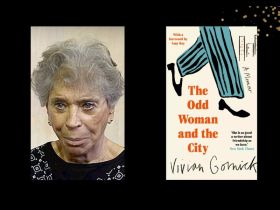‘The [Soho] Writers’ Festival is just this really amazing time!’ Nina Steiger is enthusing over the phone from the Soho Theatre and Writers’ Centre. Everything that is exciting about Soho and the writing community in London just seems to converge on the centre for three weeks, she adds.
‘There’s this incredible atmosphere of people celebrating the process, the written word – we’ve got people doing plays off the balconies, in the elevators and in the bathrooms. There’s this really exciting explosion of new plays and new ideas.’
Now in its fourth year, the Soho Theatre and Writers’ Festival is now underway until November 15. Over 100 events are taking place over the three-week period, including panel discussions hosted by leading journalists, practical workshops, play readings, and talks by stand-up comics, playwrights and literary agents.
Steiger, who moved from New York City in September to take over as Director of the centre, will talk this week about the field of literary management as well as looking at comparative examples of US theatres which support new work. However, Steiger, along with Soho Theatre Associate Director Jonathan Lloyd, also devised the festival’s Nuts and Bolts strand; a series of five workshops designed to equip aspiring playwrights with the key skills to get started on writing that play.
However, Steiger says the workshops would also be just as useful for established writers needing a kick-start.
‘It’s a good thing to do if you’re even quite an established writer, and you’ve got a bunch of plays under your belt. Or, if you’re brand new [to playwriting]… the hardest thing sometimes is starting…coming back to the basics and ignoring that voice in your head that says: “No this is a stupid idea, this has already been written this won’t turn out well”.’
The idea is not only to help writers find their voice, Steiger adds, but also, to find the inspiration as well as the discipline to actually pick up the pen or sit at a computer, and start writing. The five one-and-a-half hour workshops cover ‘what makes a play a play’, character development, exploring a sense of place, structure, and helping individual writers to find their own style.
But feedback and direction also play a part in the Nuts and Bolts workshops.
‘You can have this unwieldly bizarre first draft…Sometimes, it’s very helpful to work with people who can say: “Well, I think the hotspot of the play is right here, why don’t you just tap into that more, explore that more deeply”.’
Today’s workshop – the first of five taking place throughout this week – begins by looking at what makes a play a play, and looking at the pitfalls and the rewards of the dramatic form.
I ask Steiger what she believes are some of the most common pitfalls writers stumble across in the playwriting process.
‘The second act,’ she replies. ‘They come up with a brilliant dramatic scenario. [But] it’s the craft of structuring the plot…figuring out if and when to put in an interval. And then, how to make the second act, because the second act isn’t just a mirror image of the first, it has to round out and resound the whole story.’
Another pitfall, which may be more of a problem with the theatrical sector as a whole, is the age of writers. Some writers, Steiger notes, don’t embark on writing their first play until the age of 40 or 50. They are young writers, but not necessarily a young person. This is often an overlooked demographic, Steiger believes. However, the Writers’ Festival, in its diverse programming, includes examples of it. One such example is Alan Rusbridger, the Guardian journalist and editor who is currently embarking on writing his first play, in conversation with David Aukin.
At the other end of the spectrum is the theatre’s Young Writers Programme. Four full-length plays from STC’s latest core group of young writers will be given public readings, alongside short plays by the 14 to 19-year-old group, on November 10 and 11. In between, there are workshops led by cutting-edge theatre companies such as Frantic Assembly and Yellow Earth Theatre; and discussions on the current status of writers, theatre and politics, theatre and science, and the revolution in British theatre whereby writers at the forefront are not white, and not male.
Put simply, Steiger explains that the festival really consolidates – over a three-week period – all the work that the Writers’ Centre does throughout the year. Therefore the philosophy behind the festival is to fling the doors open wide to London’s playwriting community to showcase the resources available on their doorstep – whether it’s a quiet room to work in, office equipment or computers.
‘What the festival really does is open the doors of the theatre, and say: “Here are our resources, we’ve got the people, the facilities and the will.” And the will is the biggest part of it,’ Steiger adds. ‘We have the will to develop new work and to help writers. It pulls writers out of the isolation that so many playwrights are working in.’
The Soho Writers’ Festival runs until November 15. The STC Nuts and Bolts workshops begin today, November 3, and run until November 7. For full programme details visit the website, www.sohotheatre.com/writfest2003/




